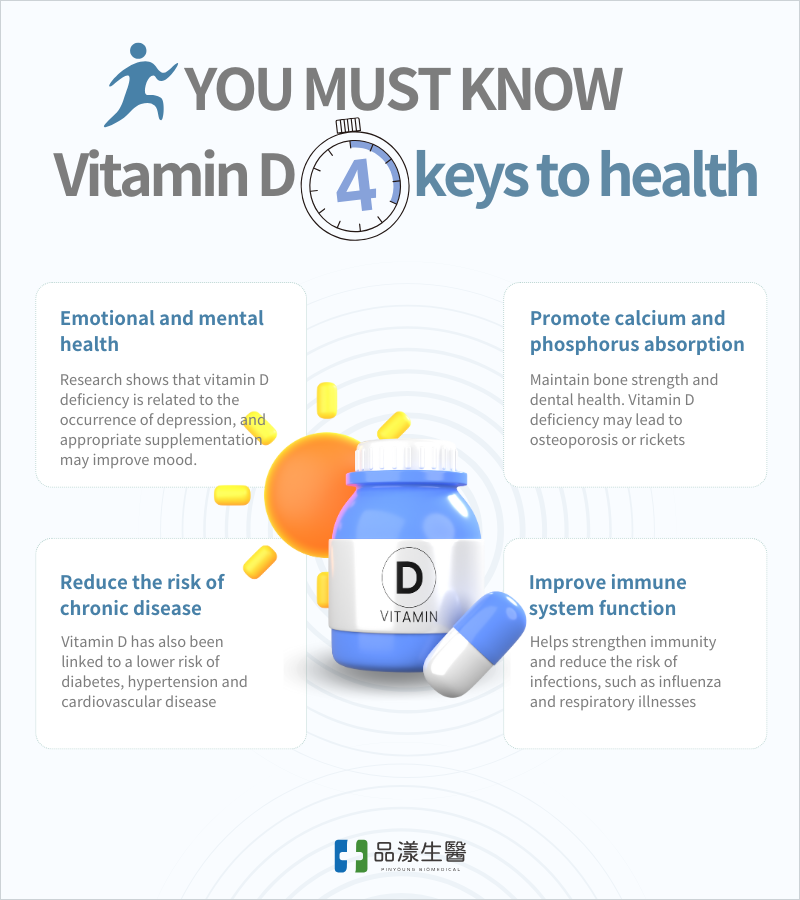1. The role of vitamin D: multi-faceted health support
Vitamin D is not only a key nutrient for maintaining bone health, but also plays an important role in other physiological systems.
- Promote calcium and phosphorus absorption
- Vitamin D helps the intestines absorb calcium and phosphorus, maintaining bone strength and dental health. A lack of vitamin D may lead to osteoporosis or rickets.
- Improve immune system function
- Vitamin D helps strengthen immunity and reduces the risk of infections, such as the flu and respiratory illnessesThe PMFA Journal。
- The connection between emotions and mental health
- Research shows that vitamin D deficiency is related to the occurrence of depression, and appropriate supplementation may improve moodThe PMFA Journal。
- Reduce the risk of chronic disease
- Vitamin D has also been linked to a reduced risk of diabetes, hypertension and cardiovascular disease.

2. Causes and symptoms of vitamin D deficiency
Modern lifestyles put many people at risk of vitamin D deficiency:
Common reasons:
- Insufficient sun exposure: Prolonged indoor activities or the use of high SPF products reduce the chance of skin synthesis of vitamin D.
- Insufficient diet: Low intake of foods rich in vitamin D, such as fish, egg yolks and dairy products.
- age: The skin’s ability to produce vitamin D is reduced in the elderly.
- health problems: Certain gastrointestinal conditions affect the absorption of vitamin D, such as Crohn's disease or celiac disease.
Deficiency symptoms:
- Bone pain and muscle weakness
- Feeling depressed or depressed
- Children may develop rickets, and adults may be at increased risk of osteoporosis or fractures.
3. How to avoid vitamin D deficiency?
| method | Recommended practices |
|---|---|
| Sun exposure | Spend at least 10-30 minutes in the sun every day, preferably in the morning or evening, to avoid UV damage. |
| diet | Increase your intake of foods rich in vitamin D, such as salmon, cod liver oil, fortified milk, etc. |
| supplements | If you don’t get enough sun exposure, you can consider taking vitamin D3 supplements. The dosage should be based on your doctor’s recommendations. |
| Test blood concentration | Check your vitamin D levels regularly so you can adjust your diet or supplement dosage appropriately. |
4. Suggestions on vitamin D needs of different ethnic groups
| ethnic group | Recommended daily intake (IU) | Special recommendations |
|---|---|---|
| Infants and toddlers (0-12 months) | 400 | Consider adding infant vitamin D drops. |
| Adults 1-70 years old | 600 | Get moderate sun exposure every day and take supplements if necessary. |
| Elderly people over 70 years old | 800 | Elderly people are advised to check blood levels regularly. |
| Pregnant and breastfeeding women | 600 | Supplementing vitamin D helps babies develop bones. |
5. Conclusion: Master vitamin D, and you will have no worries about your health.
Vitamin D plays an important role in bone health, immune system, mood management, etc. To avoid deficiencies, it is recommended to combine sun exposure, diet and necessary supplements to maintain ideal levels. Regular testing of blood levels can also help adjust supplementation based on needs.



